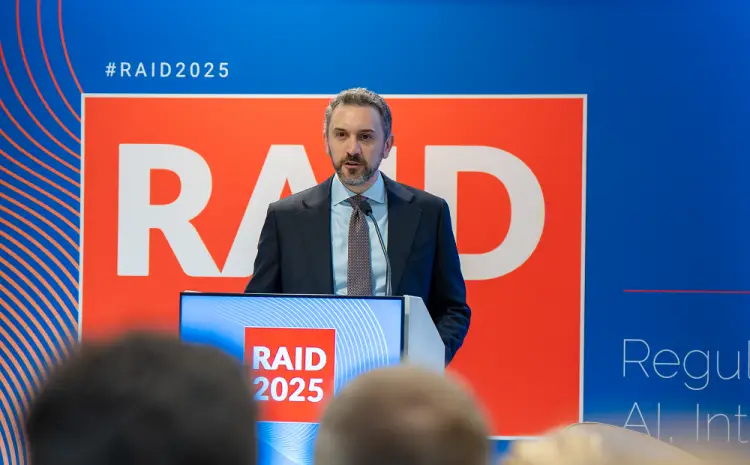Keeping AI Markets Open: The FTC’s Perspective on Competition and Innovation

Daniel Guarnera, Director of the Bureau of Competition, US Federal Trade Commission delivering a keynote address at RAID 2025
Opening day two of RAID 2025, Daniel Guarnera, Director of the Bureau of Competition at the U.S. Federal Trade Commission, delivered a wide-ranging keynote on how competition policy can underpin responsible, dynamic growth in the age of artificial intelligence.
Speaking in a personal capacity, Guarnera framed AI as “no longer the stuff of science fiction – it’s here.” Its transformative potential, he said, spans every sector the FTC engages with – from healthcare and energy to technology – yet the regulatory and policy responses remain in flux.
Guarnera structured his remarks around three observations: competition enables AI innovation; targeted law enforcement protects competition more effectively than broad-brush regulation; and healthy input markets are essential for sustainable AI growth.
Competition Drives Innovation
Tracing the FTC’s origins back to 1914, Guarnera reminded delegates that the U.S. Senate had once rejected proposals for “regulated monopolies” and instead reaffirmed free-market rivalry as the cornerstone of progress. “The progress of the world depends in large measure upon that fair, reasonable rivalry among men which has hitherto characterised the advances of civilisation,” he quoted from the founding Senate report.
That spirit, he argued, remains vital in the AI age. The rapid evolution of foundation and open-source models since 2022 has illustrated how dynamic competition drives efficiency. Even as computing power demands grow, the cost to query major foundation models has dropped 280-fold in just 18 months.
“When firms must vigorously compete on price, quality, efficiency and innovation they get better,” he said. Governments, he warned, should be wary of policies that “distort or displace competitive dynamics and effectively pick winners and losers.”
Enforcement Over Regulation
Guarnera made a clear case for targeted law enforcement as the most effective safeguard for competition in fast-moving AI markets. Unlike broad ex-ante regulation, he said, case-by-case enforcement “takes the facts as they are. The real-world market dynamics, the firm’s specific conduct, and its actual observable effects.”
He cited historical examples such as the US actions against AT&T and Microsoft, which broke monopolies and unleashed waves of innovation, arguing that “targeted interventions supported by factual records and observable effects” remain the right approach.
Excessive or misinformed regulation, he cautioned, risks freezing innovation: “Insufficiently informed regulatory intervention can lock in the wrong assumptions and freeze in place today’s status quo.”
At the same time, Guarnera acknowledged the need for targeted interventions where harms are clear, from deceptive AI marketing claims to the spread of deepfake content, noting that such actions promote both fair competition and the public’s trust in AI products.
Keeping Input Markets Open
In his third theme, Guarnera stressed that AI’s long-term success depends on competition for critical inputs such as chips, energy, cloud infrastructure, and data.
“AI doesn’t just need clever algorithms,” he said. “It requires a complex stack of infrastructure and resources.”
He warned that concentration in these markets could lock out smaller players, pointing to the FTC’s vigilance in sectors like semiconductors and cloud computing. Access to data and talent also deserves close scrutiny. The FTC, he noted, is monitoring practices like reverse acqui-hires that strip startups of key staff and intellectual property without triggering merger review.
“Our goal as a competition enforcer is not to micromanage these input markets,” he concluded. “It’s to ensure they remain open, dynamic, and contestable so that AI innovation can flourish wherever it may come from.”
A Call for Ongoing Dialogue
Closing his address, Guarnera emphasised the value of international dialogue, as exemplified by RAID 2025: “The speed at which AI is developing only highlights how important it is for researchers, industry, governments and the public to share their insights early and often.”
Ultimately, he said, the FTC’s mission in the AI era remains rooted in the same belief that guided its founding over a century ago: “The progress of the world depends on competition. We want to ensure that the future of AI is shaped by open markets and fair competition.”




